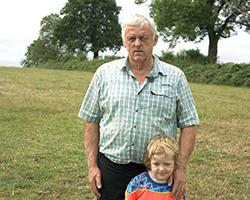Ireland builds capacity to improve men’s health

WHO
In 2008, the Irish Government released the National Men’s Health Policy 2008–2013, which included strategies for engaging men in self-care. Within this framework, the Government recently rolled out a new training programme called ENGAGE to improve the capacity of health providers and improve men’s access to and use of health services.
Focusing on determinants of men’s health is critical for improving health outcomes in the WHO European Region, particularly for noncommunicable diseases (NCDs). NCDs not only cause preventable deaths and illness, they also have deep-rooted social consequences.
This story from Ireland shows that a comprehensive and aligned health system with a multipronged approach helps to address men’s health more effectively. It comes from the landmark report “Health systems respond to noncommunicable diseases: time for ambition”, which will be launched at the upcoming 68th session of the WHO Regional Committee for Europe (RC68). The report showcases a compendium of 22 good practices from the Region.
Male life expectancy: behavioural factors
In Ireland, as in most European countries, men’s lower life expectancy is underpinned by higher death rates from NCDs – the leading cause of death and disability among men. This is compounded by men’s lifestyle behaviours and underutilization of health services.
Men tend to engage in more health-damaging activities; for example, they smoke tobacco and drink alcohol more than women. They also tend to have unhealthier diets. Consequently, men are more at risk of developing NCDs and are more likely to die prematurely.
Men are also more likely to underutilize or delay the use of health services. With the exception of the 70+ age category, men in Ireland are twice as likely to have had no consultation with a general practitioner in the previous 12 months. Evidence also shows that if men do consult a doctor, they are less likely to adhere to prescribed treatment.
ENGAGE: changing attitudes
ENGAGE, the 1-day training programme implemented by the Irish Government, aims to increase participants’ understanding of best practice in engaging men with health programmes. It is based on the training-of-trainers model, in which participants are required to deliver sessions to front-line practitioners upon completion of the course.
Health practitioners receive evidence-based tools to engage men, connect with a network of supportive peers, and learn about harmful gender roles and norms that contribute to behaviours such as underutilization of health services. The training helps raise awareness about gender-sensitive health care in order to improve the quality of care given to men, and to generate positive and sensitive clinical engagements.
The hope is that this will ignite a cultural shift, changing the attitudes of men and empowering them to become active agents in their own health.
A major and unique training resource
In the review of the National Men’s Health Policy, ENGAGE emerged as a key pillar of policy implementation. It was described as a major and unique training resource with the capacity to reach significant numbers of front-line service providers. Since the advent of ENGAGE:
- 93.4% of service providers that completed the training reported that ENGAGE has impacted their work practices;
- 39.3% have formally committed to men’s health in their work plans and/or are conducting men’s health initiatives within their services, putting men’s health at the top of their priority list; and
- the country has seen an exponential rise in community outreach programmes to priority groups of men, such as Men on the Move, a physical activity programme targeting overweight men in County Mayo in western Ireland.
Ireland’s strategy is unique in the Region, and has put men’s health on the international agenda. It also influenced the development of the forthcoming WHO regional strategy on the health and well-being of men, to be published in autumn 2018.
Towards gender-sensitive health provisions
The introduction of ENGAGE was a historic move, as gender-sensitive approaches to health have conventionally been linked with women only. Ireland now acknowledges that gender norms are as harmful to men as they are to women. The National Men’s Health Policy notes that perceived notions of gender underpin health-damaging behaviours, pointing out that “men who engage in health-damaging or risky behaviours often do so to ‘prove’ their masculinity to others”.
WHO/Europe is beginning to address the impact of gender norms on men’s health, involving men in achieving gender equity in the Region and beyond. Discussion of the regional strategy on the health and well-being of men will commence at RC68 on Wednesday, 19 September.



